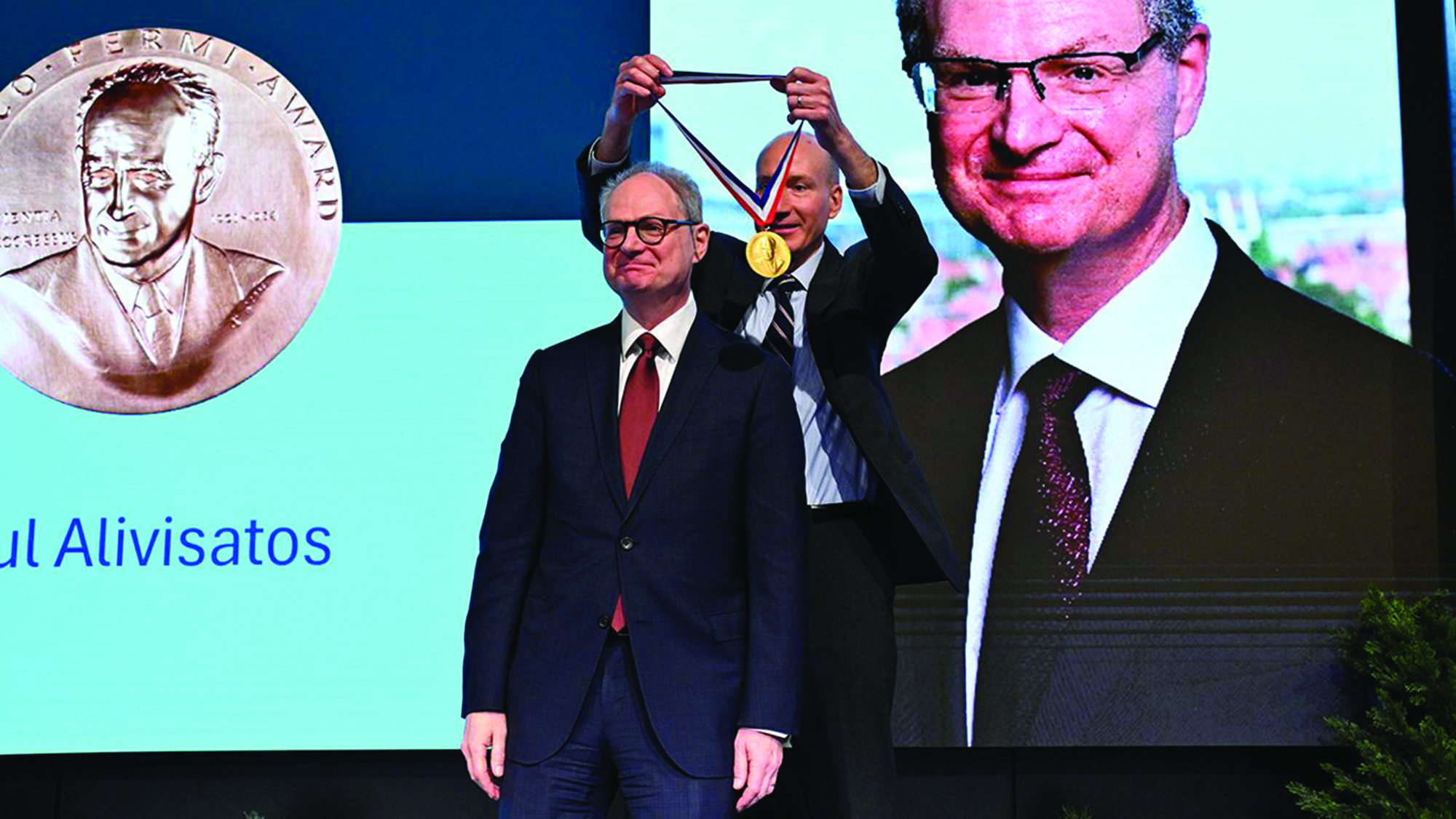
University of Chicago president Paul Alivisatos, AB’81, at a January 10 ceremony in Washington, DC, receiving the Enrico Fermi Presidential Award. (Photography by Charles Watkins, courtesy the Department of Energy)
A selection of the latest headlines from across campus.
Accolade for Alivisatos
President Paul Alivisatos, AB’81, received the Enrico Fermi Presidential Award—one of the most prestigious science and technology honors bestowed by the US government—at a January 10 ceremony in Washington, DC. Alivisatos was cited for “groundbreaking ideas and discoveries” that “have transformed nanochemistry and enabled new classes of commercially available electronic devices and materials,” said Geraldine Richmond, then–US under secretary for science and innovation. Alivisatos was honored alongside Héctor D. Abruña of Cornell University and John H. Nuckolls, the former director of Lawrence Livermore National Laboratory.
Historic recognition
David M. Rubenstein, JD’73, chair of the Board of Trustees, was awarded the Presidential Medal of Freedom, the nation’s highest civilian honor, by then-President Joe Biden on January 4. An international leader in business, public affairs, higher education, and the arts, Rubenstein was recognized for his “philanthropy and generous support for the restoration of historic landmarks and the country’s cultural institutions.” Rubenstein is co-founder and co-chairman of The Carlyle Group, one of the world’s most successful private investment firms. Renowned for his patriotic philanthropy, Rubenstein has made transformative gifts in support of numerous national monuments and museums.
Star researcher
Wendy Freedman, the John and Marion Sullivan University Professor in Astronomy and Astrophysics and the College, received the National Medal of Science, the country’s highest scientific honor, on January 3. Freedman was recognized for her pioneering contributions to cosmology, including her leadership of the team that in 2001 made a landmark measurement of the Hubble constant—the rate at which the universe is expanding. She also led the initiative to build the Giant Magellan Telescope, one of the world’s largest optical telescopes.
New College major
The University is launching a new undergraduate major in climate and sustainable growth, with enrollment beginning in Autumn Quarter 2025. The major is the first degree program anchored in the Chicago Curriculum on Climate and Sustainable Growth, a novel approach to energy and climate education being led by the Institute for Climate and Sustainable Growth. The Chicago Curriculum starts with a set of foundational courses, required for all students in the major, that explores the climate and economic growth challenge from multiple perspectives. Students will go on to specialize in one of three areas: climate science, economics and politics, or finance.
Schwarzman Scholar
College fourth-year Emily Shi has been selected as a Schwarzman Scholar, joining a program that aims to prepare future global leaders. She will pursue a master’s degree in global affairs at Schwarzman College, part of Tsinghua University in Beijing. Shi is a biological sciences and public policy double major, focusing on health and medicine from a global perspective, and plans to apply to medical school after completing the Schwarzman program. Alumna Maxime Kpangbai, AB’20, also received the prestigious scholarship (see Notes).
Potential energy
Six UChicago faculty members have received Sloan Research Fellowships, which recognize early-career scholars’ potential to make substantial contributions to their fields. Luca V. Delacrétaz, assistant professor of physics, studies collective and emergent phenomena in condensed matter physics through the lens of quantum field theory. Raul Castro Fernandez, assistant professor of computer science, explores how data affects our technological, economic, social, and cultural ecosystems. Jeremy Hoskins, assistant professor of statistics, is interested in problems at the intersection of physics, computation, and mathematics. Alexander Ji, assistant professor of astronomy and astrophysics, studies the elemental composition of the oldest surviving stars. Sarah King, assistant professor of chemistry, investigates condensed phase and interface dynamics using ultrafast spectroscopy, surface science, and materials science. Weixin Tang, Neubauer Family Assistant Professor of Chemistry, develops and applies new chemical tools to study and manipulate the biological system.
Aurora dawns
Argonne National Laboratory has fully opened its Aurora supercomputer to researchers around the world. One of the world’s first exascale supercomputers, Aurora is capable of performing at least a quintillion calculations per second. Scientists can apply to use the supercomputer to perform calculations for studies that are in many cases impossible to do elsewhere. With powerful capabilities for simulation, artificial intelligence, and data analysis, Aurora is expected to facilitate breakthroughs in fields including drug discovery, cosmology, and nuclear energy research.
Enduring legacy
Author and civil rights icon Ruby Bridges spoke at UChicago’s 35th annual Martin Luther King Jr. Commemoration Celebration on January 29. In 1960, at age 6, Bridges became the first Black student to enroll at William Frantz Elementary School in New Orleans; photographs of her on the school’s steps, accompanied by the federal marshals assigned to protect her, are among the most enduring images of the American civil rights movement. At the January event, Bridges reflected on her memories of that tumultuous year and the need to continue the fight against injustice.
